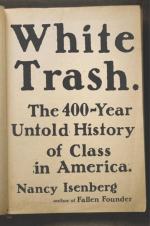|
This section contains 440 words (approx. 2 pages at 400 words per page) |

|
White Trash: The 400-Year Untold History of Class in America Summary & Study Guide Description
White Trash: The 400-Year Untold History of Class in America Summary & Study Guide includes comprehensive information and analysis to help you understand the book. This study guide contains the following sections:
This detailed literature summary also contains Topics for Discussion on White Trash: The 400-Year Untold History of Class in America by Nancy Isenberg.
Isenberg begins her journey into the origins of American class hierarchy by providing the reader with an aptly named introduction section, "Fables We Forget By," which serves as a gateway to her forthcoming arguments. The fables spun by the Founding Fathers, which have come to be accepted as historical fact, consistently ignored the existence of an unequal class hierarchy in America. This study aims to highlight the blatant existence and perpetuation of America’s class system throughout its detailed examination.
The first section of Isenberg’s study, “To Begin the World Anew,” focuses on America’s infant years, from English colonization to Independence and westward expansion. The colonial system imposed a class hierarchy based on wealth, pedigree, and land ownership, which never seem to truly leave American soil. Isenberg tracks the different usages of slang terms over the course of the eighteenth and nineteenth-centuries that come to notoriously denote poor rural whites, such as "crackers," "hillbillies," and of course, "white trash." Examples of white trash were prevalent in political discourse and popular culture alike, yet Americans continued to deny the existence of a skewed class hierarchy.
The second section of this study, “The Degeneration of the American Breed,” focuses on how white trash continued to change throughout America’s youth. Images of poor whites, regardless of what they were called, were in a constant state of flux from the antebellum period to the verge of the twenty-first century. Politicians such as the mudsill president Abraham Lincoln and good ole’ boy Lyndon Johnson helped thrust the poor white man out of the persistent trap of restricted social mobility. Yet, Isenberg highlights that these examples were a minute representation of the whole of the poor white population. Class structure remained rigid and inescapable for most of the impoverished population, while false images of class mobility were being celebrated by the lucky few who attained upward mobility.
The end of the twentieth-century ushered in a new era of class identity, which prompted a resurgence among those with redneck roots. Thus, Isenberg titles her concluding section “The White Trash Makeover.” This section takes an extensive look at the continuously changing definition of white trash. Popular icons such as Elvis, Dolly Parton, and oddly, Bill Clinton created a class of redneck chic never seen before.
Isenberg brings her study to present day, where much is left unchanged. We continue to celebrate face-value attempts at redneck humor while insisting on the inherent greatness of a classless America. Isenberg’s meticulous historical endeavor is a precautionary tale to modern society; refusing to acknowledge our class structure will only result in the widening of class rifts.
Read more from the Study Guide
|
This section contains 440 words (approx. 2 pages at 400 words per page) |

|



